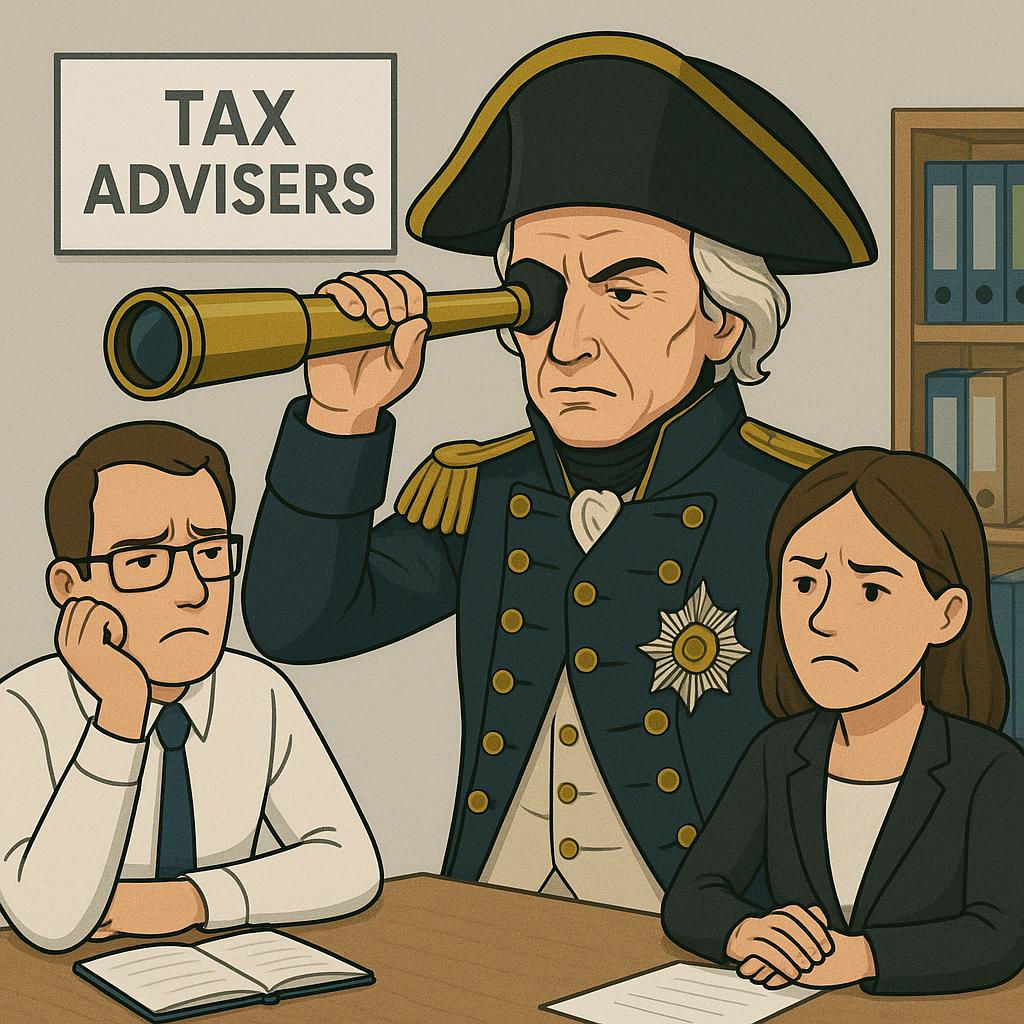
Angie
Read more
September 11, 2025 | 10 min read
Author: Andy Wood

Lord Admiral Horatio Nelson, one day, decides to buy a fine Georgian townhouse in Plymouth.
His lawyer warns him via WhatsApp that “I’m no expert in this matter. However, I think you might need to pay the higher SDLT surcharge for second homes, my Lord. I suggest we get some expert advice.”
Nelson, never one to be cowed, raises his telescope to his blind eye, squints at his lawyer’s recommendation, and proclaims: “I see no surcharge!”
Alas, in time, HMRC very much does so.
Nelson is caught with his fiscal britches down.
The tax is due.
And so, the question arises: was he merely careless, or was his conduct deliberate?
The difference reflecting the quantum of any penalty.
Nelson’s legendary “I see no ships” moment has become shorthand for deliberate blindness.
Courts have long accepted that choosing not to know can be as culpable as actually knowing.
In Manifest Shipping (The Star Sea)[1], the House of Lords confirmed that wilful blindness is a form of dishonesty. If you suspect the truth and shut your eyes, you are treated as if you knew.
This doctrine flows into tax in that “turning a blind eye” won’t save you from penalties.
In fact, as we will see, it will likely land you with a “deliberate” penalty.
Modern tax law draws a line:
It is often quite straightforward to see egregious cases of deliberate conduct (actual knowledge). Fingers in the till. Not reporting gains. Secretly stashing funds in Panamanian structures.
But in marginal cases, the difference between the two is more subtle.
Is deliberately turning a blind-eye to the accuracy of a document sufficient?
Could gung-ho ‘recklessness’ as to accuracy amount to deliberate behaviour?
Broadly, blind-eye knowledge suggests that the person ‘knows’ what they will find if they open up the bonnet and have a look inside. So, choose not to.
On the other hand, recklessness may involve taking no steps to form any kind of view at all (and, frankly, not giving a toss!)
Let’s look at some cases. We all like a good case, don’t we?
The FTT case of Auxilium Project Management[2] (“Auxilium”) was decided prior to the Supreme Court decision in Tooth (see below). In Auxilium, the FTT held that ‘a deliberate inaccuracy occurs when a taxpayer knowingly provides HMRC with a document that contains an error with the intention that HMRC should rely upon it as an accurate document.’
In Tooth, the Supreme Court similarly opined that:
“Deliberate is an adjective which attaches a requirement of intentionality to the whole of that which it describes, namely “inaccuracy”. An inaccuracy in a document is a statement which is inaccurate. Thus the required intentionality is attached both to the making of the statement and to its being inaccurate.
Tooth was followed by the UT in CF Booth[3] who approved the FTT’s decision in Auxilium.
In other words, there’s a requirement for HMRC to show an intention to mislead. Tooth did touch on whether ‘recklessness’ might be enough. But that’s a tease for now and I will revisit later.
In CPR[4], the FTT determined that a company’s VAT returns contained inaccuracies. This was as a result of supplies being treated as zero-rated without the company holding supporting evidence that zero-rating applied.
On top of this, the FTT upheld the deliberate penalties imposed by HMRC because they found:
… that the behaviour … was, therefore, deliberate as the returns had been submitted when CPR was at least reckless as to whether it had the required evidence to zero-rate’
The taxpayer appealed the penalties on the basis that anything less than subjective knowledge (ie actual knowledge) does not constitute deliberate behaviour.
During the proceedings HMRC accepted that recklessness was insufficient. However, they argued that there was actual knowledge or, at least, blind-eye knowledge of the errors / inaccuracies.
The UT therefore referred to FTT cases including Clynes[5] (again, more on this below) in which blind-eye knowledge had been found to be sufficient, and then gave its view that:
‘… where a taxpayer suspects that a document contained an inaccuracy but deliberately and without good reason chooses not to confirm the true position before submitting the document to HMRC then the inaccuracy is deliberate on the part of the taxpayer.’
The UT did, therefore, consider that blind-eye knowledge could be enough. However, it reiterated the fact that the suspicion must be more than merely fanciful.
Ultimately, the UT decided that the FTT had not made findings of fact supporting the presence of actual or blind-eye knowledge.
Other cases have considered this.
In Hague[6]:
“Even if I were to take the appellant’s belief in this respect as genuine, and not to make a finding of fact that he had actual knowledge that his wages had not borne any tax, I have no difficulty in finding that the appellant had constructive knowledge that the wages he received from his work at the Pub had borne no tax. It is apt to cite what Lord Scott stated in Manifest Shipping Company v Uni-Polaris [2001] UKHL 1 for a definition of ‘blind-eye knowledge’, which is a form of knowledge”
I confirm therefore that the appellant’s failure to notify his chargeability to tax was deliberate on the basis that his close involvement in the running of the pub business meant that he had actual or constructive knowledge that the wages he received from the Pub had not borne any income tax or NIC, which renders his failure to notify his chargeability ‘deliberate’.
Reading the case, in my opinion, the tribunal was being extremely generous in the concession that there might not be actual knowledge. However, without explicitly deploying the term “blind-eye knowledge” (they used ‘constructive awareness’), the tribunal decided the action of consciously choosing not to clarify or rectify the omissions elevated the taxpayer’s conduct from careless to deliberate.
In Shere Khan[7], HMRC alleged suppression of profits by a restaurant operator to reduce VAT and Corporation Tax. The tribunal’s examination of what had gone on revealed that the discrepancies were as a result of chaotic record-keeping rather than a calculated attempt to deceive. Crucially, the tribunal held that careless errors, no matter how messy, do not equate to blind-eye knowledge and deliberate conduct.
On blind-eye knowledge, the tribunal confirmed that suspicion alone is insufficient. A taxpayer must have more than a speculative doubt and consciously choose not to investigate.
Another case was that of Milligan[8]. Here, the eponymous Mr Milligan had ceased filing tax returns despite continuing to earn income within the self-assessment regime. The tribunal characterised his behaviour as a “head-in-the-sand” approach.
This struthionine approach led the tribunal to determine that his behaviour was deliberate (albeit not dishonest). The core reasoning was that Milligan knew of his obligations yet consciously ignored them.
As we have seen, this meets the criteria for blind-eye knowledge. In knowingly choosing not to engage, he effectively opted not to see his tax obligations.
Consequently, the tribunal upheld discovery assessments covering a 20-year period, affirming the severe implications of deliberate non-engagement.
It is perhaps a fitting reflection of our tax system that my answer would be ‘no’.
As the House of Lords set out in the Manifest Shipping case, blind-eye knowledge requires two conditions to be satisfied:
In Clyne referred to above, and where blind-eye knowledge was imputed, there were some special circumstances. Specifically, Clyne was a qualified accountant of whom a higher degree of knowledge and competence was expected, and indeed he had extensive experience in acting as a director of multiple companies (the case involved some pretty basic VAT inaccuracies).
Here, in the good Lord’s case, we assume that he did not know the document (the SDLT return) was inaccurate.
Other cases such as Milligan and Hague do not seem relevant here (unless perhaps Nelson is a seasoned property purchaser and has undertaken similar transactions in the past incurring duty in this manner?)
So, perhaps he was just was a bit ‘cavalier’ (different bit of history, I know) with his affairs.
But could he be said to be ‘reckless?’ And if so, can that cross the line?
As a reminder, ‘recklessness’ is taking an unjustified risk despite being aware of that risk. On the other hand, wilful blindness involves the conscious decision to refrain from taking steps to confirm the existence of the suspected fact.
What have the courts said about this?
In CPR it said that:
“As already explained, we do not express any view on whether an inaccuracy that is attributable to recklessness is deliberate for the purposes of the penalty regime because we were not addressed on that point.”
In Tooth, I only revealed part of the picture. Or at least didn’t emphasise the troubling bit. I’m like that:
“[47] It may be convenient to encapsulate this conclusion by stating that, for there to be a deliberate inaccuracy in a document within the meaning of section 118(7) there will have to be demonstrated an intention to mislead the Revenue on the part of the taxpayer as to the truth of the relevant statement or, perhaps, (although it need not be decided on this appeal) recklessness as to whether it would do so.”
However, fortunately, in Canada Square Operations Limited[9] some of these doubts appear to be extinguished. This was a non-tax case but heard in the Supreme Court:
“[112] As a matter of the ordinary use of language, the adjectives “deliberate” and “reckless” have different meanings. As one would expect, their ordinary meanings are reflected in dictionary definitions. For example, the Concise Oxford Dictionary defines “deliberate” as meaning “done consciously and intentionally”, and “reckless” as meaning “without thought or care for the consequences of an action”. Those definitions capture the distinction between the two words in ordinary speech.”
[…]
[153] For all these reasons, the reasoning of the Court of Appeal in relation to section 32(2) cannot be accepted. “Deliberate”, in section 32(2), does not include “reckless”.
Additionally, I am not aware of any HMRC policy to argue that ‘recklessness’ is sufficient to constitute ‘deliberate’ conduct. Instead, they are more likely to aver actual or blind eye knowledge.
But the (ship’s) wheel turns, right?
The UT, in CPR Commercials Ltd, provided some clarity and confirmed that ‘blind-eye’ knowledge of an inaccuracy would be sufficient.
However, as we have seen, in Tooth, the question of whether recklessness was enough was expressly left open by the Supreme Court in the case of tax penalties etc. That said, the Supreme Court, in Canada Square Operations, a non-tax case, were clear that recklessness is not deliberate.
So, what of the good Admiral?
Despite the fact he doesn’t suffer a deliberate penalty, Nelson is forced to pay a penalty for carelessness.
In this counterfactual history (obviously, the best type of history), Nelson is humiliated.
The newspapers rage: “Hero Admiral in tax scandal.”
Facing disgrace, this war-ing class hero resigns his commission prior to Trafalgar.
The French win.
Europe is reshaped.
Another thing we can blame on HMRC.
[1] Manifest Shipping (The Star Sea) [2001] UKHL 1
[2] Auxilium Project Management v HMRC [2016] UKFTT 249 (TC)
[3] CF Booth Ltd v HMRC [2022] UKUT 217 (TCC)
[4] CPR Commercials Limited v. HMRC [2023] UKUT 61 (TCC)
[5] Clynes v HMRC [2016] UKFTT 369 (TC)
[6] Hague v HMRC [2024] UKFTT 139 (TC)
[7] BJ Shere Khan Star City Limited v HMRC [2024] UKFTT 639 (TC)
[8] Milligan v HMRC [2025] UKFTT 498 (TC)
[9] Canada Square Operations Ltd v Potter [2023] UKSC 41